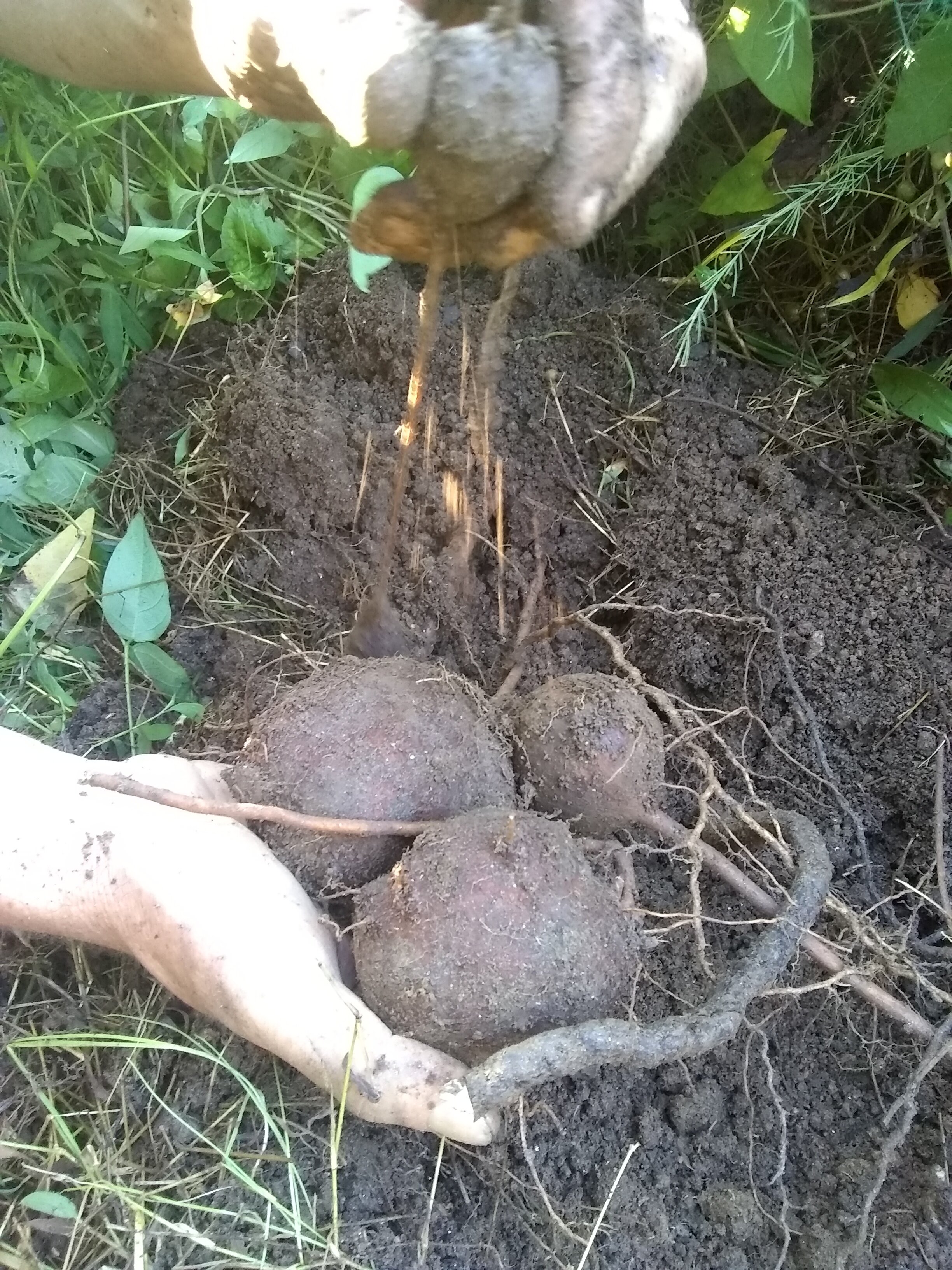 Image 1 of 3
Image 1 of 3

 Image 2 of 3
Image 2 of 3

 Image 3 of 3
Image 3 of 3




Groundnut tubers (Apios americana)
Groundnut tubers. You’ll receive a few smaller seed tubers to get you started (1-3 depending on size). Once they are established, they can really produce! Groundnuts love a rich, well-draining soil, full or part sun, and space to sprawl and climb.
I also have an area where cultivar tubers have gone feral. Happy to send these along without the label. If you select this option (Random unlabeled cultivar), you will receive more tubers per order (around 3-8).
Varieties:
Best Blackmon — this may be 1972 or 2019. I’m not sure anymore as the label has been lost for years. This variety produces very well, and you can harvest egg sized and larger tubers annually, once well-established.
Blackmon 1972 “Simon” — from the breeding of Bill Blackmon at LSU. One of his best releases.
Blackmon 2127 “Samantha” — from the breeding work of Bill Blackmon while at LSU.
Blackmon 2183 — another great selection from the breeding work of Bill Blackmon at LSU.
“Michellin Man” — another long-forgotten label of a Bill Blackmon selection. Makes dense clusters of tubers on short stolons, hence the “new” name Michellin Man.
Duke’s Delight — selection from the late James Duke, Maryland herbalist.
Indiana Diploid — fertile seed-producing strain from zone 6 in Indiana.
Peavine Island — wild selection from the Lower Susquehanna River. And old-timer name from groundnut is peavine, and this selection comes from Peavine Island, where groundnuts are still abundant in southern Pennsylvania. A fertile, diploid selection.
Bill Blackmon numbered selections — from Bill Blackmon’s most recent, at-home breeding. Some varieties are more productive for me than others — you’ll have to experiment and see which do best for you — but all worthy of cultivation. (The ones which are more productive for me have more options in stock.) Selections are named numbers: 1.8, 1.9, 2.5, 2.6, 2.7, 2.8, 2.9, 2.10, 2.11, 2.13, 2.14, 2.15, 2.17.
Groundnut tubers. You’ll receive a few smaller seed tubers to get you started (1-3 depending on size). Once they are established, they can really produce! Groundnuts love a rich, well-draining soil, full or part sun, and space to sprawl and climb.
I also have an area where cultivar tubers have gone feral. Happy to send these along without the label. If you select this option (Random unlabeled cultivar), you will receive more tubers per order (around 3-8).
Varieties:
Best Blackmon — this may be 1972 or 2019. I’m not sure anymore as the label has been lost for years. This variety produces very well, and you can harvest egg sized and larger tubers annually, once well-established.
Blackmon 1972 “Simon” — from the breeding of Bill Blackmon at LSU. One of his best releases.
Blackmon 2127 “Samantha” — from the breeding work of Bill Blackmon while at LSU.
Blackmon 2183 — another great selection from the breeding work of Bill Blackmon at LSU.
“Michellin Man” — another long-forgotten label of a Bill Blackmon selection. Makes dense clusters of tubers on short stolons, hence the “new” name Michellin Man.
Duke’s Delight — selection from the late James Duke, Maryland herbalist.
Indiana Diploid — fertile seed-producing strain from zone 6 in Indiana.
Peavine Island — wild selection from the Lower Susquehanna River. And old-timer name from groundnut is peavine, and this selection comes from Peavine Island, where groundnuts are still abundant in southern Pennsylvania. A fertile, diploid selection.
Bill Blackmon numbered selections — from Bill Blackmon’s most recent, at-home breeding. Some varieties are more productive for me than others — you’ll have to experiment and see which do best for you — but all worthy of cultivation. (The ones which are more productive for me have more options in stock.) Selections are named numbers: 1.8, 1.9, 2.5, 2.6, 2.7, 2.8, 2.9, 2.10, 2.11, 2.13, 2.14, 2.15, 2.17.
Groundnut tubers. You’ll receive a few smaller seed tubers to get you started (1-3 depending on size). Once they are established, they can really produce! Groundnuts love a rich, well-draining soil, full or part sun, and space to sprawl and climb.
I also have an area where cultivar tubers have gone feral. Happy to send these along without the label. If you select this option (Random unlabeled cultivar), you will receive more tubers per order (around 3-8).
Varieties:
Best Blackmon — this may be 1972 or 2019. I’m not sure anymore as the label has been lost for years. This variety produces very well, and you can harvest egg sized and larger tubers annually, once well-established.
Blackmon 1972 “Simon” — from the breeding of Bill Blackmon at LSU. One of his best releases.
Blackmon 2127 “Samantha” — from the breeding work of Bill Blackmon while at LSU.
Blackmon 2183 — another great selection from the breeding work of Bill Blackmon at LSU.
“Michellin Man” — another long-forgotten label of a Bill Blackmon selection. Makes dense clusters of tubers on short stolons, hence the “new” name Michellin Man.
Duke’s Delight — selection from the late James Duke, Maryland herbalist.
Indiana Diploid — fertile seed-producing strain from zone 6 in Indiana.
Peavine Island — wild selection from the Lower Susquehanna River. And old-timer name from groundnut is peavine, and this selection comes from Peavine Island, where groundnuts are still abundant in southern Pennsylvania. A fertile, diploid selection.
Bill Blackmon numbered selections — from Bill Blackmon’s most recent, at-home breeding. Some varieties are more productive for me than others — you’ll have to experiment and see which do best for you — but all worthy of cultivation. (The ones which are more productive for me have more options in stock.) Selections are named numbers: 1.8, 1.9, 2.5, 2.6, 2.7, 2.8, 2.9, 2.10, 2.11, 2.13, 2.14, 2.15, 2.17.